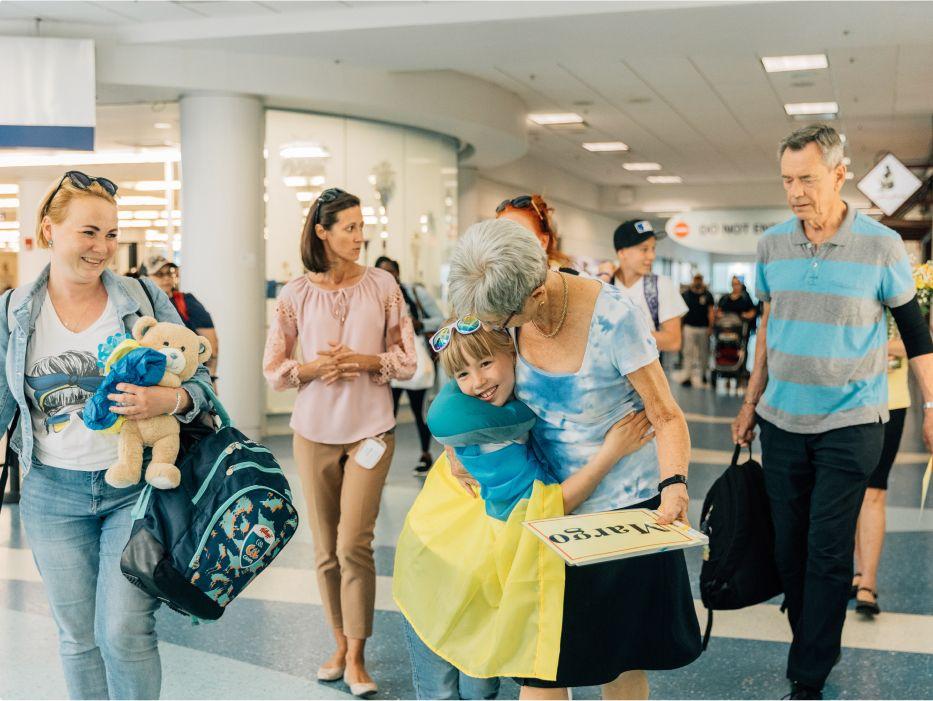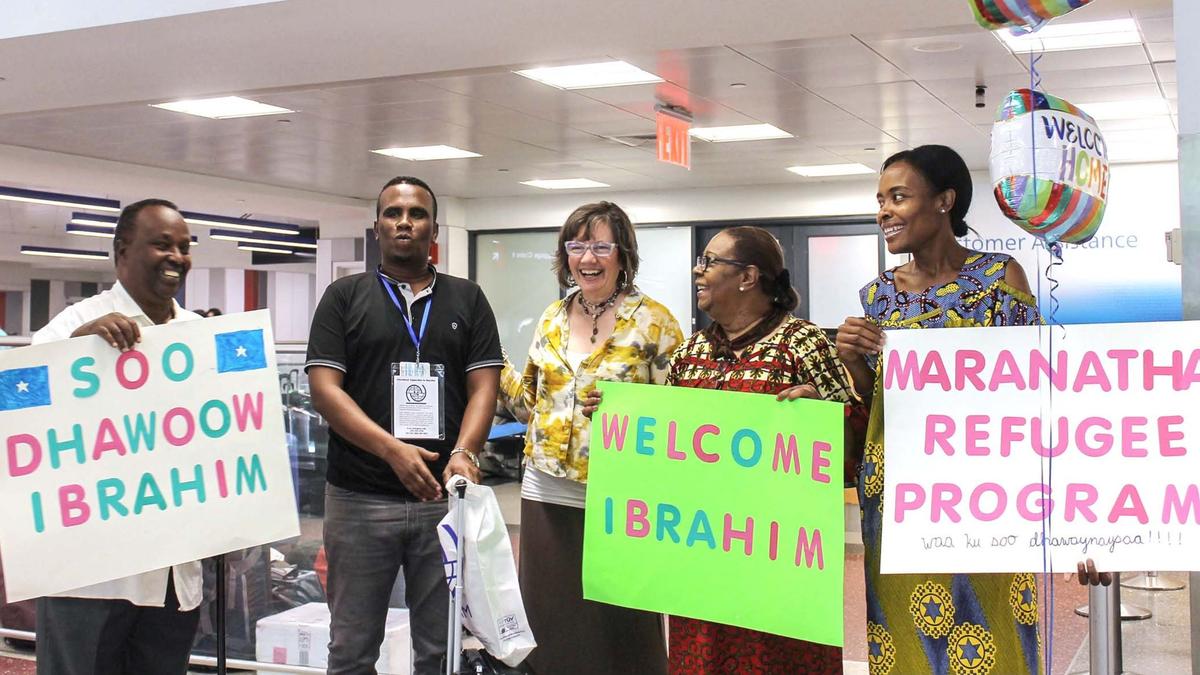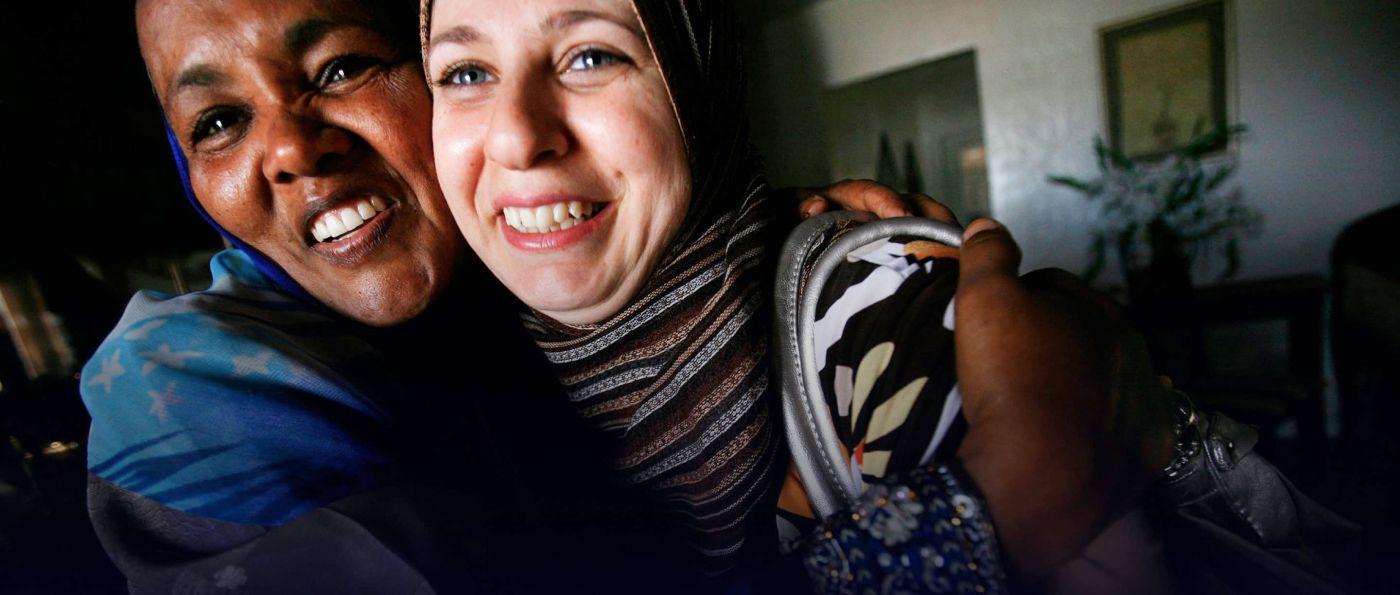
Intro to Welcoming
Welcoming is any act that helps newcomers in need of safety thrive in their new communities. Americans in every state have opened their hearts and communities to support newcomers who have fled their homes.

Who is a welcomer?
Welcomers are more than volunteers—they’re friends and neighbors who support newcomers through acts like private sponsorship, guidance in their new neighborhoods, donations, and celebrating important moments together. Every act of welcome is meaningful.
Why welcoming matters right now
A record number of people across the globe who have been forced to flee their homes due to violence, conflict, and persecution are searching for safety. Inspired by our American ideals, Welcomers eagerly support newcomers to help them rebuild their lives and flourish in their new communities.
Welcoming is good for our communities:
- Newcomers fill critical vacancies in the workforce.
- Newcomers contribute to the economic development of communities in decline by starting their own businesses, buying homes, and paying taxes.
- Every act of welcome expands our capacity to support newcomers, leading Americans to rediscover their neighbors and connect beyond our differences.
When Americans participate in welcoming, we all benefit by connecting deeply with one another and learning from our new neighbors.
How are Americans welcoming newcomers right now?
No act of welcome is too small. Welcomers are:
- Contacting their representatives in support of private sponsorship programs.
- Hosting neighborhood events to raise awareness about the benefits of newcomers and talk about ways they can take action together.
- Sharing their stories of Welcome in local media.
- Leading compassionate, nonpartisan conversations with friends and family about the important work of welcoming in their communities.
When welcoming works for everyone: The private sponsorship model
Private sponsorship is a safe, legal, and orderly way to welcome newcomers forced to flee their homes.
How it works: Traditional refugee resettlement pathways rely on government-funded resettlement agencies to welcome refugee newcomers to specific locations in the U.S. Private sponsorship enables Americans nationwide to welcome newcomers and help them integrate into their new communities. Rural and suburban areas, in particular, saw private sponsorship as an opportunity to help families seeking safety, encourage population growth, and assist workforce development needed to revitalize their communities.
In the private sponsorship model, the U.S. government rigorously vets and approves people seeking safety. American Welcomers raise funds, find housing, help with job searches, and enroll newcomer children in school. Resettlement agencies or community-based organizations provide expert support to Welcomers throughout the process.
Sponsorship is a safe and legal community-driven solution that provides the support newcomers and communities need to thrive together.
Sponsorship by the numbers

2 million
Through private sponsorship, an estimated 2 million Americans in more than 12,000 zip codes raised their hands to sponsor nearly 800,000 newcomers in three years.

$7 billion
We estimate sponsors leveraged over $7 billion in their own time and resources to welcome newcomers to their communities.

30+
Each sponsor reports they engage with more than 30 people in their community to help welcome newcomers, allowing Americans to connect with their neighbors, and enhancing integration outcomes for newcomers and communities.
Frequently asked questions about sponsorship
What’s happening with sponsorship programs right now?
Most refugee admissions, including private sponsorship programs, have been paused by the U.S. government. But the need hasn’t disappeared, and neither has Americans’ desire to help.
Americans committed to seeing the revival of sponsorship programs have been contacting their representatives, speaking out in support of sponsorship, and supporting newcomers in other ways.
What kinds of sponsorship programs existed?
The Welcome Corps This U.S. State Department program allowed Americans to sponsor refugees from around the world and was terminated by the current administration. Newcomers who already arrived in the U.S. through the program can still pursue permanent residency and citizenship.
Humanitarian Parole Uniting for Ukraine (U4U): Provided a pathway to safety for Ukrainians fleeing war. The U.S. government has paused U4U. Find the latest policy updates on U4U here.
The Processes for Cubans, Haitians, Nicaraguans, and Venezuelans (CHNV): Provided a pathway to safety to newcomers from Cuba, Haiti, Nicaragua, and Venezuela. The U.S. government has terminated CHNV and revoked status for newcomers who arrived through the program. Find the latest policy updates on CHNV here.
Can I still apply to sponsor newcomers?
While no formal private sponsorship pathway currently exists, the U.S. government continues to issue Special Immigrant Visas (SIV) to Afghan allies who served with the U.S. military or government. Americans can sign up to support Afghan families and help them find housing, employment, and enroll children in school. Americans also can sponsor an Afghan ally or family through the Sponsor Circle program. The Welcome.US sponsor fund provides financial assistance to make sponsorship accessible.
Stories of welcome


Stories of Welcome
Boston church group continues its mission of welcome through Welcome Corps
August 18, 2023

Get involved
Sign up for updates about Welcome.US, policy changes impacting newcomers and how you can get involved.


